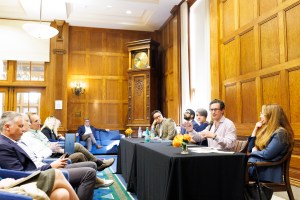An ocean of bad tidings
At Peterson lecture, marine ecologist Jeremy B.C. Jackson delivers dire news
Jeremy B.C. Jackson earned his first chops as a scholar by studying the ecological impacts of an event that unfolded over the last 15 million years: the formation of the Isthmus of Panama, dividing the Atlantic and Pacific oceans and setting off profound evolutionary oceanic and terrestrial changes.
Today Jackson is a reluctant expert on a far more modern issue — the failing ecological health of the world’s marine ecosystems, which are taking dramatic hits from global warming, pollution, and over-fishing.
The world-acclaimed marine ecologist, co-founder of the Shifting Baselines Media Campaign, is a professor at the Scripps Institution of Oceanography at the University of California, San Diego, and works with the Smithsonian Tropical Research Institute.
He was in Cambridge Sunday (April 6) to receive the Roger Tory Peterson medal. The award has been presented annually since 1997 by the Harvard Museum of Natural History (HMNH) in honor of the late ornithologist, artist, naturalist, and author.
Past medal recipients — esteemed for their powerful roles in “understanding of the world, and our place in it,” said HMNH Executive Director Elisabeth Werby — include E.O. Wilson (Pellegrino University Professor Emeritus at Harvard), Paul R. Ehrlich, Richard E. Leaky, Peter Matthiessen, Sir David Attenborough, and (last year) primatologist Jane Goodall.
“Think of Jeremy Jackson as the conscience of marine scientists,” said James J. McCarthy, who along with Werby introduced the Yale-trained geologist to a capacity crowd at Lecture Hall B at Harvard’s Science Center.
McCarthy, professional friends with Jackson since 1971, is Harvard’s Alexander Agassiz Professor of Biological Oceanography and from 1997 to 2001 co-chaired the Intergovernmental Panel on Climate Change, which last year shared with Al Gore the Nobel Prize for Peace.
Jackson’s fact-packed address — profane, unsettling, and improbably witty — was titled “Brave New Ocean,” a 40-minute description of the state and fate of the world’s troubled seas, and what humankind has to do about it.
“This is a not a fun talk,” he said, “though I’ll try to cheer you up at the end.”
First, the dire impacts of global warming on the Earth’s marine ecosystems penetrated the world of science decades later than it should have, said Jackson. His own warnings about dying coral reefs came in 1995.
“I had virtual rotten eggs thrown at me,” he said of the tumult that greeted his ideas at a scientific workshop. “Two years later everybody was on the bandwagon.”
In 2001, Jackson and a team of researchers published a report in the journal Science, using centuries of data to explore the ecological consequences of over-fishing. The story hit every front page in the country, he said, and changed his quiet scientific life into one of hard-nosed advocacy for marine ecosystems battered by modernity.
For oceans in decline, six main issues stand out, said Jackson.
Over-fishing has slashed the biomass of available fish stocks worldwide and reduced the ecological diversity of seas once teeming with life. Just after World War II, Japanese fishing trawlers were getting 10 fish for every 100 hooks. Soon after, they were getting barely one per 100 hooks.
In the Caribbean, there was a historical abundance of green turtles — an estimated 91 million of the thousand-pound marine animals, whose biomass was equivalent to all the bison in precolonial North America. Today, said Jackson — a student of the seabeds the turtles feed on — there are fewer than 300,000.
Fishing stocks are shrinking, along with the average size of the fish. Jackson, to nervous laughter from the audience, showed dockside catch pictures from 1957, 1974, and 2007 — fish of declining size and abundance that comically illustrate an undersea world now dominated by “sardines, anchovies, and mud,” he said.
Ocean floors are being flattened by the plow lines dragged behind fleets of trawlers — a dredging process that destroys benthic (deep) ecosystems and has already impacted three-quarters of the world’s continental shelves.
Exotic species are invading vulnerable oceans, including Caulerpa taxifolia, a “killer algae” toxic to fish and other plants, said Jackson. It flourishes like a marine kudzu, crowding out native undersea plants and tipping marine ecologies into oblivion.
Global climate change is warming the world’s oceans and turning the water gradually acidic, bleaching coral reefs, and reducing calcified organisms like reef coral and mollusks. Summertime Arctic ice is disappearing, polar ice caps are melting, and to escape change, “species are galloping toward the poles,” said Jackson.
Food webs that depend on marine environments are being poisoned with mercury, PCBs, and other toxins. Even wild salmon spawning in pristine Alaska streams are dying.
Eutrophication — over-fertilization from agricultural runoff — is turning coastal ocean waters slimy. “We flush all the garbage of humanity into the ocean,” said Jackson — and at the same time poison the mollusks and oysters that have historically screened particulates in coastal estuaries. “We killed the filters,” said Jackson.
There are ever-expanding “dead zones” in the oceans of the world — 150 so far, including a vast patch of the Gulf of Mexico. They’re dominated by jellyfish and by thriving blooms of bacteria that can make coastal living hazardous to humans.
Without action, the marine world of the future will resemble what H.G. Wells imagined in his novel “The Time Machine,” said Jackson, “a world of slime and giant crabs.”
The time for action is now, starting with what we already know, he said. “As scientists, we need to have greater courage to make predictions — instead of hiding behind the appeal to get more and more data.”
Humans need to stop over-fishing, shut off the spigot on nutrient and toxic pollution, and reverse climate change.
“We need to do it all at once,” said Jackson — a level of action that means “changes in the way we live that are so profound they are unimaginable.”
His action plan for recovering marine health:
“Stop stupid fishing” in the open ocean, said Jackson, and develop responsible technologies for aquaculture. All the technical and management tools are in place — held back only by “corruption and greed,” he said.
Eliminate subsidies for fertilizers and impose taxes on wastes that end up at sea — runoff from farms, lawns, golf courses, and livestock operations.
Cap carbon emissions in 10 years and make large reductions in 20 years.
And “search for a miracle,” said Jackson — a technology that will sequester emissions of carbon dioxide, the chief greenhouse gas.
A good place to start, he said: Throw off apathy and become politically engaged.
“Our so-called leaders are facilitators of our consumption,” said Jackson, “and the ‘Brave New Ocean’ is not going to go away until we become citizens again.”





